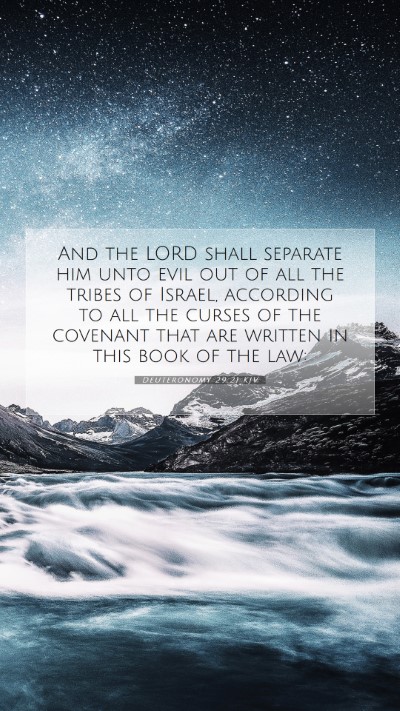Understanding Deuteronomy 29:21
Deuteronomy 29:21 states, "And the Lord shall separate him unto evil out of all the tribes of Israel, according to all the curses of the covenant that are written in this book."
This verse carries deep implications for the understanding of God's covenant with His people and serves as a sober reminder of the consequences associated with disobedience to God's commandments. In this commentary, we will explore the verse's meaning, its context, and its significance through insights gleaned from public domain commentaries.
Contextual Background
To fully grasp the meaning of Deuteronomy 29:21, it is essential to understand its place within the Book of Deuteronomy and the larger narrative of the Old Testament. Deuteronomy is often seen as a restatement of God’s law, where Moses instructs the Israelites before they enter the Promised Land.
- Moses' Warning: This verse is part of Moses' farewell address, where he warns the Israelites about the potential consequences of turning away from God.
- Covenant Relationship: The phrase "curses of the covenant" refers to the divine agreements established at Mount Sinai, where blessings were promised for obedience and curses for disobedience.
Bible Verse Meaning and Interpretations
Matthew Henry notes that this verse illustrates the severity of God's judgment upon those who forsake Him. Those who choose to rebel are said to be "separated unto evil," indicating a divine removal from His protection and favor.
Albert Barnes elaborates by emphasizing the specific actions that could lead to this separation. He explains that both individual and national disobedience would attract God's wrath, affecting the wider community as a result of the covenant.
Adam Clarke adds depth by speaking about the significance of the “curses” mentioned. He argues that they serve as both a warning and an ingrained part of the social and religious fabric of Israel, designed to remind the people of their moral and spiritual responsibilities.
Key Themes in Deuteronomy 29:21
- Separation and Judgment: God's distinctive role in judging those who turn away from Him, marking a separation in their relationship.
- Covenantal Faithfulness: A call to uphold the covenant agreement, highlighting that neglecting these responsibilities can result in severe spiritual consequences.
- Collective Responsibility: The reminders within the verse are not solely personal; they resonate with the collective ethos of the Israelite community, emphasizing unity in obedience.
Applications and Significance
For modern readers, Deuteronomy 29:21 can serve as a cautionary tale about the importance of maintaining a relationship with God and the perils of falling away from faith.
Understanding this verse encourages:
- Self-Reflection: Individuals are prompted to examine their own lives concerning faithfulness and adherence to God's commands.
- Community Awareness: Calling upon belief groups to remain steadfast, knowing that communal faith can impact the broader society.
- Historical Perspective: A deeper exploration of the Old Testament prophecies and their fulfilled implications can provide richer insights into the covenant's enduring nature.
Related Scriptures
This verse can be cross-referenced with:
- Deuteronomy 28:15: Details the curses that will come upon Israel for disobedience.
- Joshua 23:15-16: Reiterates the consequences of abandoning God's laws.
- Romans 11:22: Discusses the severity of God's judgment and goodness.
Conclusion
In summary, Deuteronomy 29:21 serves as a solemn reminder of the consequences tied to disobedience against God's covenant. The insights from biblical commentaries provide essential understanding and depth to this verse. Believers are encouraged to reflect on their obedience to God and the communal nature of their faith, aligning with the overarching narrative of Scripture.
Utilizing tools and resources for Bible study can enhance grasp of such profound topics, benefiting both personal reflection and group discussions. As readers delve into the depths of Scripture, engaging with these themes on both individual and communal levels can lead to transformative insights.


